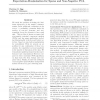326 search results - page 46 / 66 » Principal Component Analysis for Distributed Data Sets with ... |
ICIP
2007
IEEE
14 years 2 months ago
2007
IEEE
In our previous work we presented a new 2D-3D mixed face recognition scheme called Partial Principal Component Analysis (P2 CA) [1]. The main contribution of P2 CA is that it uses...
NIPS
2004
13 years 9 months ago
2004
We study gender discrimination of human faces using a combination of psychophysical classification and discrimination experiments together with methods from machine learning. We r...
ICML
2008
IEEE
14 years 8 months ago
2008
IEEE
We study the problem of finding the dominant eigenvector of the sample covariance matrix, under additional constraints on the vector: a cardinality constraint limits the number of...
ISBI
2004
IEEE
14 years 8 months ago
2004
IEEE
We propose a novel method for reconstructing a complete 3D model of a given anatomy from minimal information. This reconstruction provides an appropriate intra-operative 3D visual...
PCM
2007
Springer
14 years 2 months ago
2007
Springer
The two-dimensional Principal Component Analysis (2DPCA) is a robust method in face recognition. Much recent research shows that the 2DPCA is more reliable than the well-known PCA ...

